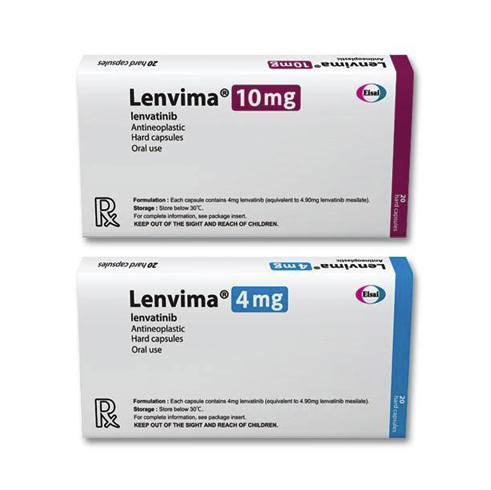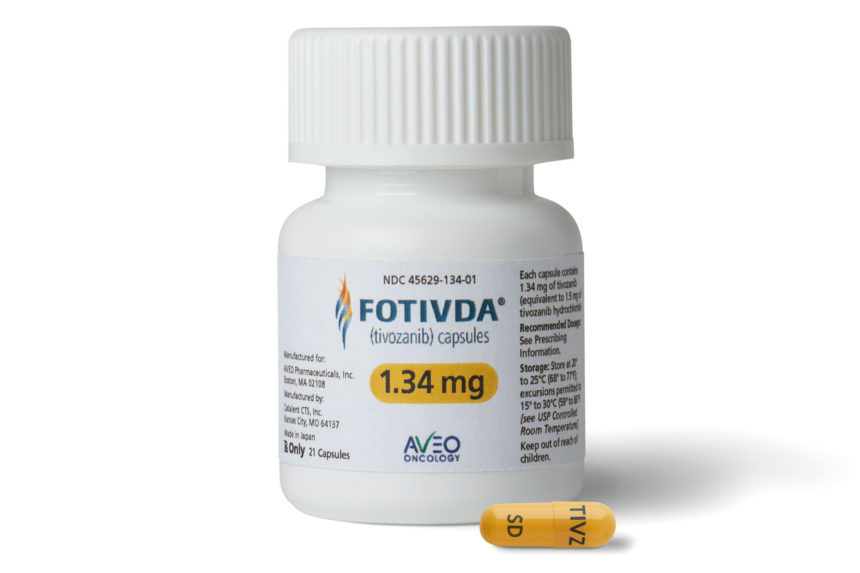Lenvima (lenvatinib) vs Fotivda (tivozanib)
Lenvima (lenvatinib) vs Fotivda (tivozanib)
Lenvima (lenvatinib) and Fotivda (tivozanib) are both oral tyrosine kinase inhibitors used in the treatment of advanced renal cell carcinoma (kidney cancer), but they differ in their spectrum of kinase inhibition and side effect profiles. Lenvatinib targets multiple pathways including VEGFR1-3, FGFR1-4, PDGFR alpha, RET, and KIT, potentially offering broader anti-tumor activity, but may also be associated with a higher rate of certain side effects such as hypertension and fatigue. Tivozanib, on the other hand, is more selective for VEGFR1-3, which may result in a different side effect profile, potentially making it a preferable option for patients who may not tolerate the side effects of lenvatinib or who have specific contraindications.
Difference between Lenvima and Fotivda
| Metric | Lenvima (lenvatinib) | Fotivda (tivozanib) |
|---|---|---|
| Generic name | lenvatinib | tivozanib |
| Indications | Thyroid cancer, renal cell carcinoma, hepatocellular carcinoma | Renal cell carcinoma |
| Mechanism of action | Receptor tyrosine kinase inhibitor | Receptor tyrosine kinase inhibitor |
| Brand names | Lenvima | Fotivda |
| Administrative route | Oral | Oral |
| Side effects | Hypertension, diarrhea, fatigue, decreased appetite, weight loss, and abdominal pain | Hypertension, fatigue, diarrhea, decreased appetite, nausea, and dysphonia |
| Contraindications | Hypersensitivity to lenvatinib or any component of the formulation | Hypersensitivity to tivozanib or any component of the formulation |
| Drug class | Multi-kinase inhibitor | Multi-kinase inhibitor |
| Manufacturer | Eisai Co., Ltd. | Aveo Pharmaceuticals |
Efficacy
Lenvima (Lenvatinib) Efficacy in Kidney Cancer
Lenvima, also known as lenvatinib, is a medication that has been approved for the treatment of advanced renal cell carcinoma (RCC), which is the most common type of kidney cancer. It is often used in combination with everolimus, another cancer medication, after one prior anti-angiogenic therapy has been tried. Lenvatinib works by inhibiting various receptor tyrosine kinases that are thought to contribute to the angiogenic, or blood vessel forming, properties of cancer cells. Clinical trials have demonstrated that the combination of lenvatinib and everolimus significantly prolongs progression-free survival compared to everolimus alone, indicating an improvement in delaying the progression of the disease.
In a pivotal Phase 2 clinical trial, the combination of lenvatinib and everolimus showed a median progression-free survival of 14.6 months compared to 5.5 months for those treated with everolimus alone. Additionally, the objective response rate, which measures the percentage of patients with a significant reduction in tumor size, was notably higher in the combination therapy group. These findings suggest that lenvatinib, particularly when used in combination with everolimus, is an effective treatment option for patients with advanced RCC who have already received prior anti-angiogenic therapy.
Fotivda (Tivozanib) Efficacy in Kidney Cancer
Fotivda, or tivozanib, is another targeted therapy approved for the treatment of advanced renal cell carcinoma. Tivozanib is a potent selective vascular endothelial growth factor receptor (VEGFR) tyrosine kinase inhibitor. By blocking the VEGFR, tivozanib prevents the growth of blood vessels that supply the tumor with nutrients and oxygen, which is essential for tumor growth. The approval of tivozanib was based on its ability to achieve a longer progression-free survival compared to other therapies in patients with advanced RCC.
In the Phase 3 trial known as TIVO-3, which led to its approval, tivozanib demonstrated a median progression-free survival of 5.6 months compared to 3.9 months for sorafenib, another tyrosine kinase inhibitor. Additionally, tivozanib showed a favorable response rate and a manageable safety profile. The results from this trial support the use of tivozanib as an effective treatment option for patients with advanced RCC, including those who have failed previous regimens. It is particularly noted for its efficacy in the third-line setting, where treatment options are limited.
Regulatory Agency Approvals
Lenvima
-
European Medical Agency (EMA), European Union

-
Food and Drug Administration (FDA), USA

-
Health Canada

-
Pharmaceuticals and Medical Devices Agency (PMDA), Japan

-
Therapeutic Goods Administration (TGA), Australia

Fotivda
-
European Medical Agency (EMA), European Union

-
Food and Drug Administration (FDA), USA

Access Lenvima or Fotivda today
If Lenvima or Fotivda are not approved or available in your country (e.g. due to supply issues), you can access them via Everyone.org.
How it works

Make an enquiry
Choose the medicine you want to buy, answer a couple of questions, and upload your prescription to speed things up. We’ll get back to you within 24 hours.


Make an enquiry
Choose the medicine you want to buy, answer a couple of questions, and upload your prescription to speed things up. We’ll get back to you within 24 hours.


Breeze through the paperwork
We'll guide you through the required documents for importing unapproved medicine, ensuring you have all the necessary information.


Get a personalized quote
We’ll prepare a quote for you, including medicine costs and any shipping, administrative, or import fees that may apply.


Receive your medicine
Accept the quote and we’ll handle the rest - sourcing and safely delivering your medicine.

Some text on this page has been automatically generated. Speak to your physician before you start a new treatment or medication.
Let's talk
If you have any questions, call us or send us a message through WhatsApp or email:
Contact us




